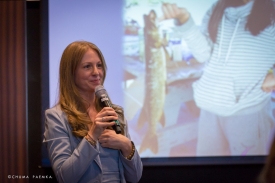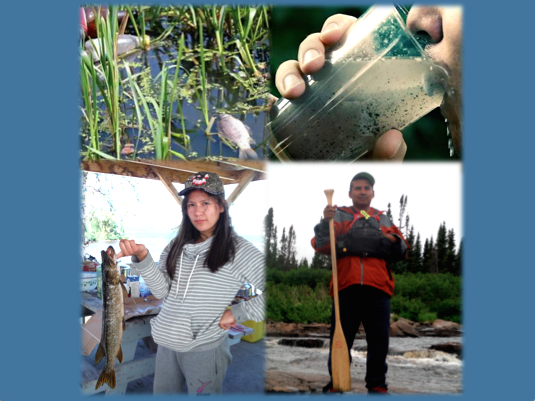Kristy Franks is an INDI (individualized program) graduate student at Concordia, studying water ethics and water education through the lens of Cree youth. Her speech, ‘Diving Into The Human Water Relationship’, explained the different worldviews that shape our water resources and consumption. Kristy was the MA winner of Concordia’s 3 Minute Thesis Competition, held on April 10th. From there, she advanced to the Eastern Regional 3MT Competition, where she took home 3rd place and received the People’s Choice Award. Now, it’s onto Nationals - video recordings from regions will be profiled for a two week period on the Canadian Association for Graduate Studies (CAGS) website. Three non-specialist judges will choose the national winner and a runner up based on those video presentations. The People's Choice winner will be awarded on the number of likes a particular video has received, so check back for Kristy’s video on May 15th, when all Canadian 3MT videos go live.
We chatted with Kristy to hear about her experiences so far. Here are some of her reflections and wisdom on communication skills and graduate research:
What have been some big takeaways from your 3-Minute Thesis experience?
Public speaking and communication are valuable skills that we don’t often have the chance to practice during a graduate program, so the 3MT experience provides a great opportunity to build and practice such skills. Especially in the midst of writing a thesis while spending days on end alone with articles and a computer, it’s nice to counteract that isolating experience with something social that forces us to express ourselves verbally and physically in addition to intellectually. With my research I often feel stuck in my head so it’s really a privilege to be able to have an audience who acts almost like a sounding board to get me out of my head! The three minute limit encouraged me to be very focused and present – to be very ‘in the moment’ - and to make the most of every moment. Because every moment - every syllable of every word, every breath, and every pause - count. It’s a microcosm experience of a very important life lesson!
Some of this skills I gained include learning how to modify my research ‘pitch’ depending on the audience, and specifically, how to explain it to a broad non-specialized multi-disciplinary group of people, how to deal with nerves before performing, how to accept and positively use feedback, how to express complex ideas in concise terms, how to be aware of body language and speech intonations. Academically, I think I benefited from the process of condensing my research. It really encouraged me to understand what is most interesting about my work, to both myself and to others, which isn’t always the same thing!
Tell us about your preparation process?
The coaching sessions were very helpful. The coaches we dedicated and supportive and helped build up our confidence (of the 3MT competitors). They helped us find appropriate terminology, tone and gave valuable feedback on which parts of our research to emphasize. There was a nice feeling of support among the competitors; many of us had gotten to know one another through the coaching sessions (as we were present for each other’s coaching moments as well as our own). It was a fulfilling process to see how the speeches (my own and those of other students) evolved over the weeks preparing for the big day. The wine and cheese afterwards (after the stress of the competition having dissipated) was a lovely chance to learn more about the research of other students and to chat with the judges and others from the Concordia community; it’s rare to have such an interdisciplinary gathering and it made for extremely interesting conversations!
Last words of wisdom?
My recommendations for students considering the 3MT or public speaking about their research in general: Do it! And to make the most of the coaching sessions. Also, practice saying your speech in different ways, playing with different vocabulary, different speeds, etc. Something that really helped me was to record myself giving the speech and then listening to it to be able to improve it.



 Kristy's (lone) 3MT slide
Kristy's (lone) 3MT slide